Top Experimental Biotech Project Ideas for Beginners
Hey biotech enthusiasts, are you tired of the same old project topics? The ones that are passed down from the seniors barely spark any real excitement or originality.
Well, to be honest, Biotech students already have a lot on their plates. From lectures, exams, to practicals, and then the project work. And when you are going to spend so much time on your project work, don’t you think it should be something that sparks your curiosity?
The truth is, most of the students do not understand the importance of project work. Your project is not just another requirement to gain marks. It’s your chance to shine. It shows your potential to your future employers, professors, and the scientific community. Your project talks about what you are capable of beyond grades.
So if you are wondering what project ideas will grab the attention and not just gather dust in a lab notebook, we have got your back. Whether you are into DNA, microbes, or AI, this list will help you choose the right project. The one that is meaningful, relevant, and genuinely exciting.
Let’s dive into the 10 most powerful and trending biotech project ideas with a surprise at the end. These Project Ideas for BSc & MSc could make your resume stand out from the thousands of others.
- Antimicrobial Resistance (AMR): Tracking Superbugs in Local Water
You must have come across numerous articles and research papers discussing the growing antimicrobial resistance (AMR). Over the years, this issue has become one of the most significant public health threats worldwide. It’s a global emergency. The microbes carrying these resistance genes could be growing silently in your local lakes or streams.
What’s the idea?
You will be testing bacterial resistance in local water sources to identify hidden public health threats.
What to do?
Collect water samples, isolate microbes, and test antibiotic resistance using discs. Compare resistance levels across different sites. Optionally sequence resistance genes.
Tools required:
Nutrient agar, antibiotic discs, spectrophotometer, and PCR kit (optional).
- Simple version: Antibiotic disc diffusion method.
- Advanced version: PCR/sequencing of resistance genes.
Career Impact & Why It Stands Out:
- Prepares you for public health microbiology, pharma QC, and epidemiology research.
- The outputs of this project are Resistance heat maps, comparative graphs, or posters.
- This project is suitable for student journals or as a showcase project in AMR hackathons.
- Plant-Based Bioplastics: Eco-Friendly Alternatives
Plastic waste has always been a major concern worldwide. To tackle this, bioplastics are often seen as the best biodegradable alternatives. These Project Ideas for BSc & MSc not only appeal to environmentalists but also to industries. Generally, industries seek sustainable materials, and creating biodegradable plastics from natural sources could be the solution the world is looking for.
What’s the idea?
You can develop biodegradable bioplastics from common plant-based starch.
What to do?
Extract starch from potatoes, corn, or banana peel, add glycerol/vinegar, prepare plastic sheets, and test strength, flexibility, and degradation rates.
Tools required:
Balance, hot plate, drying oven, beakers, tensile tester (if available).
- Simple version: Fabricate starch-based plastics and do water durability tests.
- Advanced version: Compare biodegradability rates of multiple starch sources under varying conditions.
Career Impact & Why It Stands Out:
- Prepares you for sustainable materials R&D, environmental biotech, and food packaging sectors.
- Outputs: Prototype bioplastic sheets and biodegradation comparison charts.
- Competition angle: Ideal for iGEM-style sustainability competitions.
- CRISPR-Cas9 Virtual Simulation
The revolutionary gene editing technology, CRISPR, is one of the most exciting topics. But most undergraduates can’t access it in the lab. Don’t worry, you can explore it virtually. Yes, you read it right. You can now work with CRISPR.
What’s the idea?
This will provide you with an opportunity to explore gene editing virtually using free simulation platforms.
What to do?
Use Benchling or CRISPR RGEN tools to design guide RNAs, target a gene of interest (e.g., cancer-related), and run off-target analysis. Present your data as a case study.
Tools required:
Internet access, CRISPR design software.
- Simple version: gRNA design for a model gene.
- Advanced version: Case study linking gRNA targeting to real disease intervention.
Career Impact & Why It Stands Out:
- Prepares you for genome engineering and biotech startup roles.
- Outputs: Workflow diagrams, annotated targets, GitHub repo.
- Publishing angle: Can be published as educational or computational biology projects.
- Probiotics & Gut Health: DIY Fermentation
With the recent pandemic, people have become more focused on their health. Especially, gut health plays a major role in immunity, digestion, and even mental health. Probiotic foods, such as yogurt and fermented drinks, are rich in beneficial microbes.
What’s the idea?
In this project, you will analyze beneficial microbes from homemade probiotic foods.
What to do?
Prepare yogurt, kefir, or kanji, plate samples onto agar, and study microbial diversity. Advanced students can use sequencing for microbial identification.
Tools required:
Agar, incubator, microbiology tools, and 16S rRNA sequencing access.
- Simple version: Agar plating and colony count comparisons.
- Advanced version: DNA sequencing for microbial ID.
Career Impact & Why It Stands Out:
- Prepares you for food biotech, microbiome startups, and nutritional sciences.
- Outputs: Growth analysis graphs, microbiome profiles.
- Publishing angle: Great for food biotech conferences and poster competitions.
- Biosensors: Glucose or pH Monitoring
With modern science and technology, biosensors are the future of medical diagnostics, food safety, and environmental monitoring. Biosensors utilize biological materials, such as enzymes or antibodies. They are used to translate biological reactions into an electrical signal that can then be analysed.
What’s the idea?
This project is about building a basic biosensor to detect glucose or pH changes.
What to do?
Design a simple sensor (paper or agar) and integrate glucose oxidase or pH dye. Test it with real samples like juices.
Tools required:
Micro-pipettes, sensors, and a multimeter (if electrochemical).
- Simple version: Paper-based colorimetric biosensor.
- Advanced version: Electrochemical biosensor with data logging.
Career Impact & Why It Stands Out:
- Prepares you for biomedical engineering and diagnostic technology roles.
- Outputs: Prototype biosensor prototypes, proof-of-concept datasets.
- Competition angle: Demonstrable in innovation contests.
- Bioinformatics: Mutation Analysis of Cancer Genes
Bioinformatics is now an integral part of any biotech research. All thanks to growing genetic data. Learning how to analyse mutations is a golden skill for future researchers. The world is moving towards personalized medicine and cancer biology, and this project can use your edge in this competitive world.
What’s the idea?
You can use computational biology to study DNA mutations linked to cancer.
What to do?
Use COSMIC/NCBI databases to collect mutations, analyze impacts using PolyPhen/SIFT, and visualize protein structures in PyMOL.
Tools required:
Internet, bioinformatics software, and a computer.
- Simple version: Sequence alignment and mutation identification.
- Advanced version: Structural visualization of protein mutations.
Career Impact & Why It Stands Out:
- Prepares you for bioinformatics analyst and personalized medicine roles.
- Outputs: Mutation impact tables, PyMOL visualizations, GitHub scripts.
- Publishing angle: Perfect for student bioinformatics workshops or journal case studies.
- Bioremediation: Cleaning Heavy Metal Waste
Most of the industries have one serious problem: pollution from heavy metals. You can solve this issue with tiny organisms. Microbes can absorb or detoxify these metals. This can help biotech industries to clean up toxic metals from soil and water.
What’s the idea?
You are going to explore microbial detoxification of heavy metals.
What to do?
Isolate bacteria/fungi from polluted sites and expose them to metal solutions. Measure absorption rates.
Tools required:
Microbiology lab, AAS (atomic absorption spectrometer).
- Simple version: Growth curve analysis with heavy metals.
- Advanced version: Quantitative absorption analysis with spectrometry.
Career Impact & Why It Stands Out:
- Prepares you for environmental biotech and industrial bioremediation careers.
- Outputs: Absorption efficiency graphs, environmental impact report.
- Publishing angle: Very relevant for student environmental biotech presentations.
- RNA Interference (RNAi) Virtual Study
RNAi is widely used in gene therapy and functional genomics across the world. With RNAi, the treatment of diseases is changing. From cancer to viral infections, researchers are using RNAi to find answers. You can design target-specific small interfering RNAs (siRNAs) for genes.
What’s the idea?
You will work on the model that shows how RNA interference silences disease-linked genes computationally.
What to do?
Pick a disease-linked gene, design siRNA sequences, and predict efficiency using online tools.
Tools required:
Internet, RNAi software.
- Simple version: siRNA design only.
- Advanced version: In-silico modeling of silencing efficiency.
Career Impact & Why It Stands Out:
- Prepares you for functional genomics and gene therapy research careers.
- Outputs: Target siRNA database, silencing potential charts.
- Competition angle: Applicable in computational biology fairs.
- Enzyme Engineering with Natural Extracts
Enzymes are crucial in food, pharma, and industrial processes. Finding natural enhancers or inhibitors has wide applications.
What’s the idea?
The main idea of this project is to enhance enzyme activity using plant extracts.
What to do?
Test how natural extracts affect the activity of enzymes like protease or amylase. Check stability under heat/pH.
Tools required:
Spectrophotometer, centrifuge, water bath.
- Simple version: Extract preparation and single-factor testing.
- Advanced version: Parameter optimization and enzyme kinetics studies.
Career Impact & Why It Stands Out:
- Prepares you for food and pharma R&D roles.
- Outputs: Stability curves, enzyme activity datasets.
- DNA Barcoding of Local Plants
DNA barcoding is a technique for species identification. It has applications in biodiversity studies, conservation, and agriculture.
What’s the idea?
For this project, use DNA barcoding for biodiversity and species identification.
What to do?
Collect plants, extract DNA, amplify rbcL/matK with PCR, and match sequences against databases.
Tools required:
PCR, gel electrophoresis, and sequencing access.
Career Impact & Why It Stands Out:
- Prepares you for taxonomy, biodiversity, and conservation research.
- Simple version: PCR band visualization.
- Advanced version: Full sequence analysis and bioinformatics integration.
- Outputs: Sequence datasets and phylogenetic trees.
- AI in Drug Discovery (Cutting Edge)
The new buzzing bee in modern science, AI, is carving out its own niche in Life science research. You can now solve the world’s most complex processes with AI. Yes, with AI, you can now predict the drug and make the necessary changes that are required for fast-tracking the drug discovery process.
What’s the idea?
All you have to do is apply machine learning to predict drug properties.
What to do?
Use PubChem/ChEMBL datasets, train a simple model to predict drug-likeness or bioactivity.
Tools required:
Python, scikit-learn, datasets.
Career Impact & Why It Stands Out:
- Prepares you for AI-driven biotech and pharma informatics careers.
- Simple version: Dataset analysis with basic classifiers.
- Advanced version: Neural networks for drug-target prediction.
- Outputs: GitHub repo, trained model, research poster.
- Competition angle: Highly relevant for AI in life sciences hackathons.
- Synthetic Biology DIY Kit Project (Cutting Edge)
Another biotech sensation is a field known as Synthetic Biology. In today’s modern scientific world, there are no boundaries. So, you don’t need a high-end lab for Project Ideas for BSc & MSc. You can design basic gene circuits or even create glowing bacteria in your college lab. This is affordable, safe, and gives you hands-on experience.
What’s the idea?
You will be building a simple synthetic biology project using DIY kits.
What to do?
Buy a synthetic biology educational kit to engineer glowing bacteria or model gene circuits.
Tools required:
DIY bio kit, lab safety tools.
Career Impact & Why It Stands Out:
- Prepares you for synthetic biology startups and innovation hubs.
- Simple version: Glowing bacteria demonstration.
- Advanced version: Designing custom gene circuits.
- Outputs: Photographs, genetic designs, tutorials.
Choosing a biotech project is not just about passing your semester. It’s about making your mark. From tackling AMR to working on AI-driven drug discovery, your project can tell a story worth sharing. These Project Ideas for BSc & MSc will help you to stand out from the rest.
Choose a project that excites you, but also one you can showcase online (LinkedIn, GitHub, ResearchGate). A well-documented project that lives beyond your semester can open doors to research internships, higher studies, and biotech jobs.



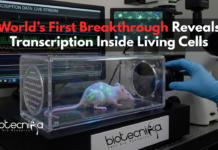
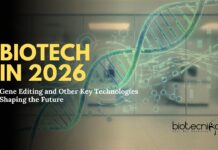
















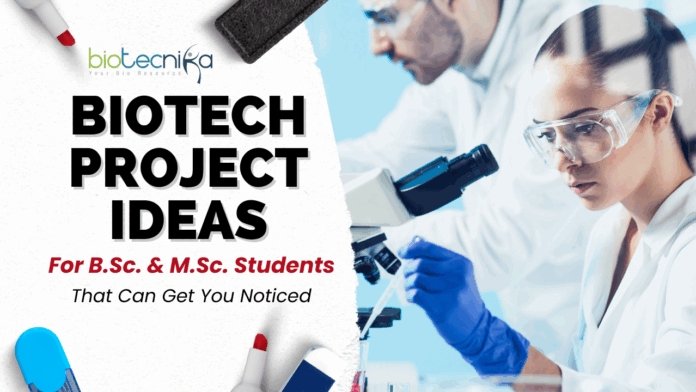
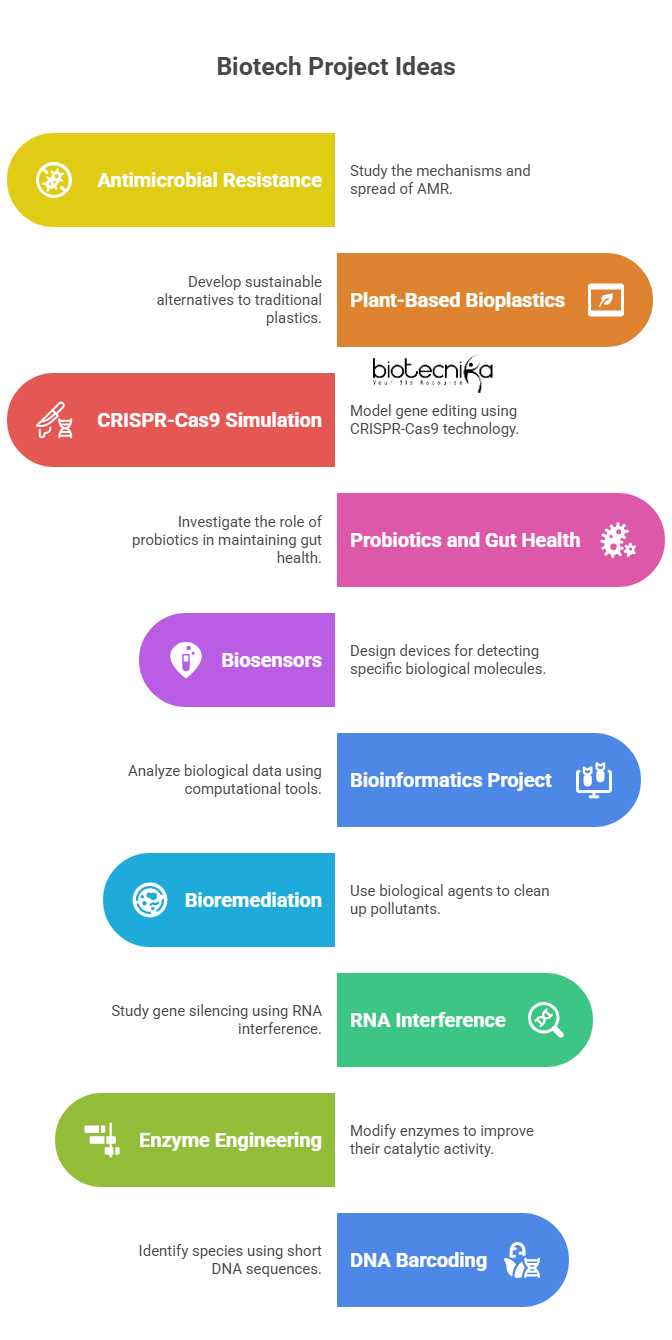
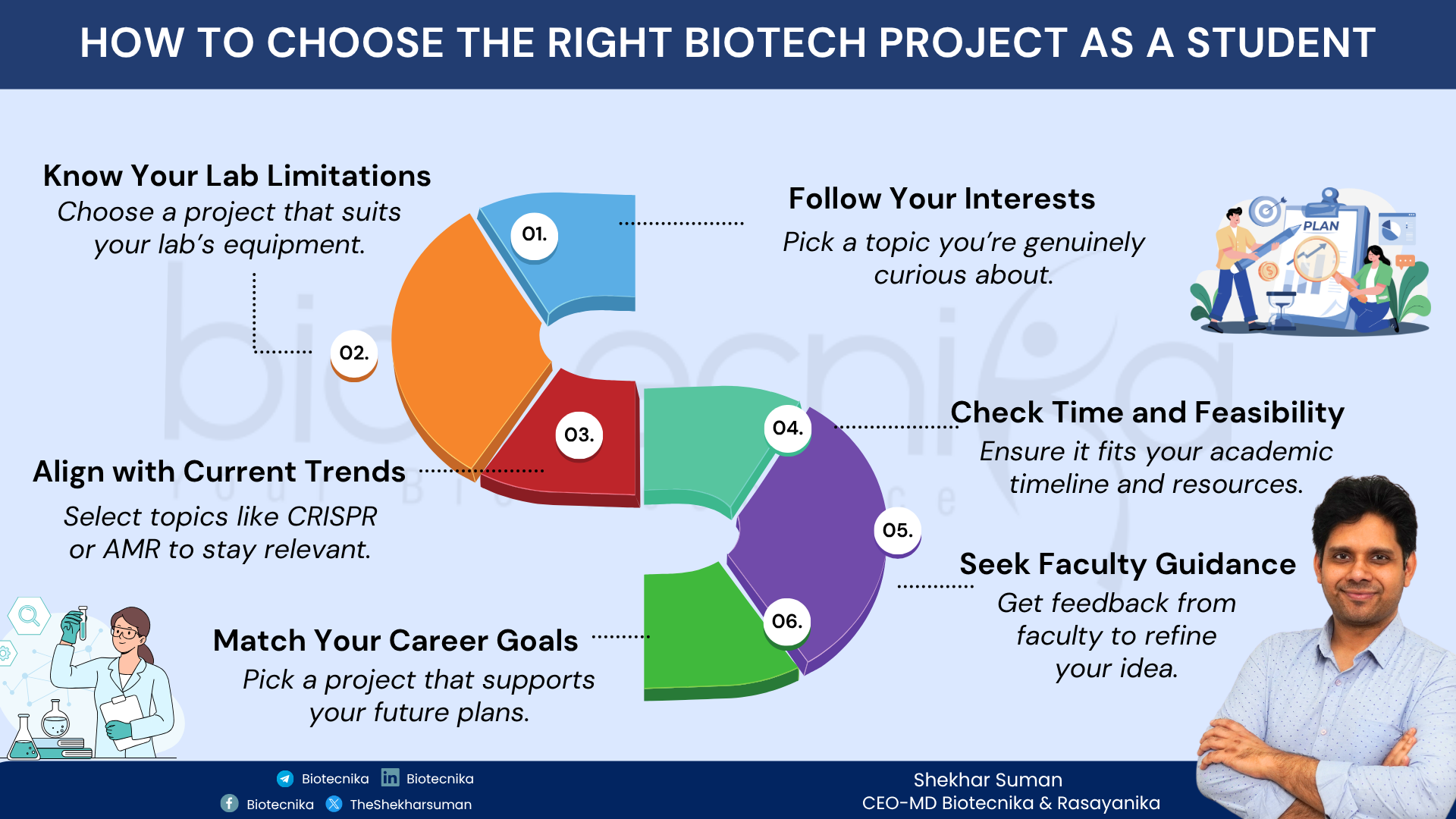







Can we do this type of researchers in our college and can submit to you….
Also , can we use these topics as a our research topics… Or should we choose from our own..
Thank you so much.
I was actually looking for topic for my post graduation project.
It really helped me.
Some topic i guess can do a reasearch for thesis.